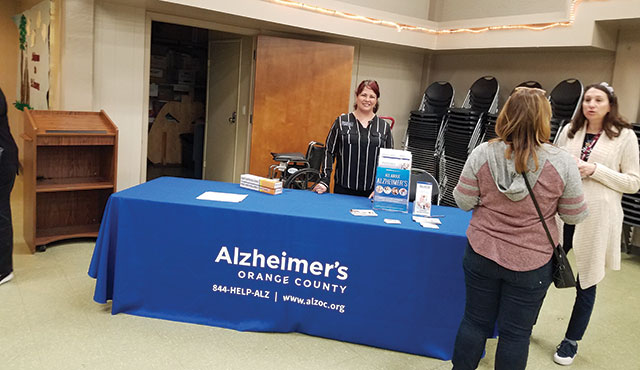St. Irenaeus Health Ministry in January sponsored a powerful and informative workshop, Connecting & Communicating with Someone with Memory Loss: A New Way of Talking, on how to better communicate with a person who has memory. About 65 people attended the workshop, held in the parish hall. The primary speaker was Kari Walker, director of Education at Alzheimer’s Orange County, but there were also representatives from other organizations who spoke about free programs that they offer to give supportive assistance to caregivers and families of people who have memory loss. These included representatives from the Family Caregiver Resource Center, who talked about a care plan and a three-week class for caregivers, and The Council on Aging, who focused on health insurance counseling and HICAP (Health Insurance Counseling & Advocacy).
Kari Walker discussed Alzheimer’s disease as a communication disorder that requires a new way of talking. She said that communication is an art that involves three main components: body language, tone of voice, and content, or actual words. The person who has memory loss may no longer make sense of spoken words, but are most affected by body language, such as gestures, eye contact and posture. Tone of voice is also an important factor of communication. Therefore, giving physical cues, such as handing the toothbrush and paste to the person with memory loss is much more effective than saying, “Brush your teeth.” Also, the manner with which you interact with the patient is vital. Kari quoted Maya Angelou to make her point, “I’ve learned that people will forget what you said, people will forget what you did, but people will never forget how you made them feel.”
Kari presented a brief overview of Alzheimer’s disease, showing its progression and biological attributes. There are two types of this disease: Early Onset, which accounts for only 2 – 5% of cases, begins before the person is 64 years old and is more progressive, and regular Alzheimer’s disease, which progresses relentlessly over 8 to 10 years and is terminal. Changes due to Alzheimer’s disease include losses in: memory of how to do virtually everything, language and communication; executive functions, such as planning and judgment; visual and spatial perception, leading to balance issues, and behavior. She called Alzheimer’s disease a disease of emotions because it causes confusion and discomfort, resulting in behavioral problems. Therefore, we need to find out how to alleviate the person’s confusion and discomfort to calm them. Tools, such as redirecting the person to an activity that they enjoy, such as taking a walk, expressing interest in whatever the person is saying or doing, playing music that they like, and the importance of patience were discussed. Adjusting your approach can make a big difference in improving your relationship with someone who has memory loss. Kari recommended focusing on the person’s remaining skills, not on their losses. Kari encouraged caregivers to go to a support group to learn strategies on how to cope and how to better connect to the person with memory loss.
Vern Atwood from Right At Home spoke briefly about his dream for Cypress to be “dementia friendly”. The odds for getting dementia are 1out of 9 for people over age 65 and 1out of 3 for people who are age 85 or over. We need to reduce the stigma associated with this disease that is afflicting a growing portion of our population.
Jennifer Dagarag, St. Irenaeus’ Faith Community Nurse also spoke about her role in the parish. She invited parishioners to call the parish office for a confidential visit to talk about health and caregiver issues. She also does home visits, can refer you to other helpful resources and can help you navigate the medical system.
If you have any questions, please contact Monica Kovach, Health Ministry Facilitator, at 310-490-6113.

